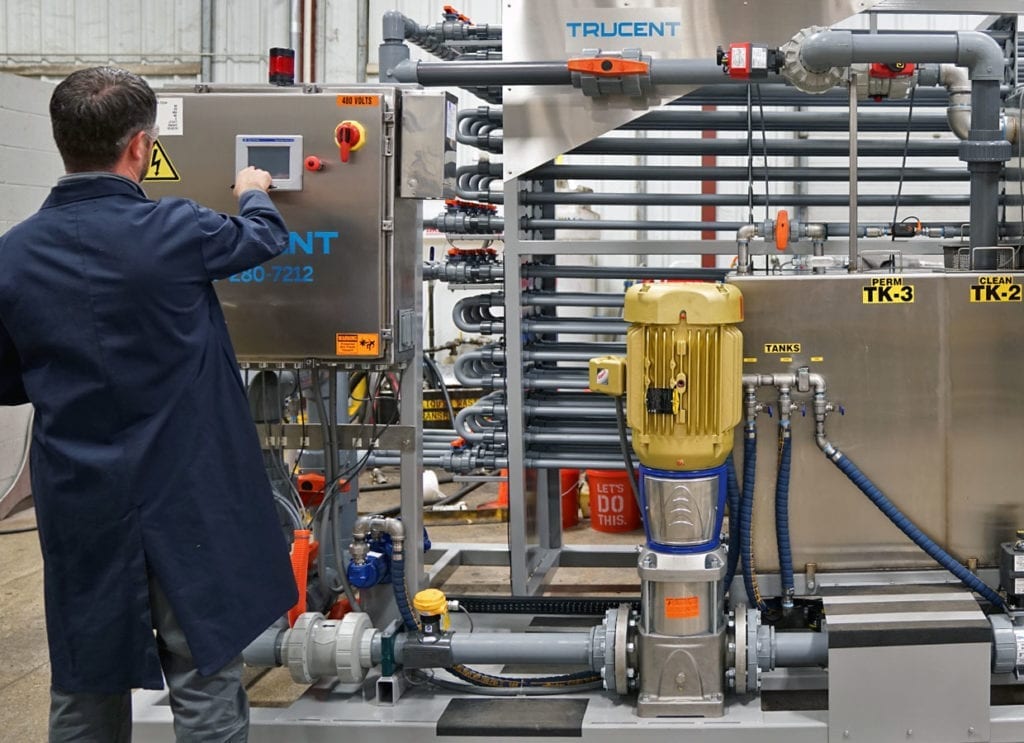Industrial Waste Water Treatment-- Shield the Atmosphere with Expert Water Treatment Providers
Industrial Waste Water Treatment-- Shield the Atmosphere with Expert Water Treatment Providers
Blog Article
Advancements and Advancements in Hazardous Waste Water Therapy Technologies
The landscape of commercial wastewater treatment is undergoing a transformative change, driven by developments that enhance both performance and sustainability. As regulative standards develop, the assimilation of AI and maker understanding right into wastewater monitoring systems assures to make sure and enhance operations compliance.
Overview of Waste Water Treatment Technologies
Wastewater treatment innovations incorporate a range of techniques developed to eliminate pollutants from commercial effluents prior to their launch into the environment. These technologies are vital for maintaining ecological equilibrium and making sure compliance with ecological laws. The main groups of wastewater treatment include physical, chemical, and biological techniques, each serving distinct functions based upon the nature of the impurities present.

Organic therapy approaches utilize bacteria to deteriorate natural issue, making them especially efficient for organic-rich effluents. Techniques like triggered sludge and biofilm reactors harness the natural degradation capacities of microorganisms, leading to considerable decreases in biochemical oxygen demand (FIGURE)
Advanced Filtering Strategies
Advanced purification strategies represent a critical evolution in the realm of commercial wastewater treatment, boosting the efficiency of contaminant removal procedures. Industrial Waste Water Treatment. These methods incorporate a series of innovations, consisting of microfiltration, ultrafiltration, nanofiltration, and turn around osmosis, which provide sequential obstacles for numerous bit dimensions and chemical structures
Microfiltration and ultrafiltration utilize membrane systems to remove suspended solids, bacteria, and larger organic molecules, enhancing the quality of effluent prior to further therapy. Nanofiltration connects the space in between ultrafiltration and reverse osmosis, efficiently getting rid of organic compounds and divalent ions, thus reducing the load on downstream procedures.
Reverse osmosis provides the highest degree of filtration by enabling only water and tiny molecules to pass with its semi-permeable membrane layers, making it optimal for recovering premium water from industrial effluents. Current advancements in membrane layer modern technology, including the growth of more sturdy and fouling-resistant materials, have actually considerably boosted functional efficiency and decreased costs.
Incorporating these sophisticated filtration strategies not just enhances the general therapy procedure yet likewise adds to sustainability efforts by enabling water reuse and resource recovery in commercial settings. (Industrial Waste Water Treatment)
Organic Therapy Developments

Moreover, the growth of crafted organic systems, such as membrane layer bioreactors (MBRs), incorporates organic therapy with sophisticated membrane purification. This combination permits greater effluent quality and lowered footprint, making it appropriate for space-constrained industrial facilities. Technologies check here in genetically crafted microbes have additionally arised, boosting the biodegradation of specific impurities, such as drugs and hefty steels, that are commonly testing to remove.
Additionally, the execution of bioaugmentation methods, where beneficial microbes are introduced to enhance the existing organic treatment processes, has revealed appealing lead to enhancing therapy performance. These technologies collectively represent a trend in the direction of more lasting and efficient biological therapy approaches that can adjust to the developing complexities of industrial wastewater streams. As markets remain to prioritize ecological conformity, these biological advancements will play an essential duty in learn the facts here now wastewater administration.

Source Recovery Approaches
In industrial settings, the combination of source recuperation methods has come to be progressively crucial for boosting sustainability and minimizing waste. These approaches concentrate on removing useful materials and energy from wastewater streams, thereby transforming possible contaminants right into reusable resources.
One popular strategy is nutrition recovery, where nitrogen and phosphorus, typically present over in wastewater, are caught and exchanged fertilizers. This not just minimizes environmental impacts but likewise provides a round economic climate remedy for agricultural applications. Additionally, modern technologies such as anaerobic food digestion allow for the conversion of natural waste into biogas, a renewable energy resource that can offset fossil gas usage in commercial procedures.
Furthermore, progressed filtration and membrane innovations help with the recuperation of industrial spin-offs such as salts and metals. These recuperated products can be reintegrated into manufacturing procedures, lowering the need for virgin resources.
Future Patterns in Drainage Monitoring
As markets progressively prioritize sustainability, the future of wastewater management is readied to undertake substantial improvements. Technological advancements, such as synthetic knowledge and equipment learning, will allow extra effective tracking and management of wastewater systems. These modern technologies can anticipate upkeep demands, enhance treatment processes, and enhance decision-making, inevitably reducing functional costs and ecological effect.
Moreover, the assimilation of circular economic situation principles will certainly play an essential role in wastewater administration. Industries are anticipated to shift towards systems that not only treat wastewater yet additionally recover valuable sources, such as nutrients, water, and power. This shift will minimize waste and promote the reuse of products, aligning with international sustainability goals.
Emerging treatment techniques, such as membrane layer bioreactors and advanced oxidation processes, will additionally boost the effectiveness of wastewater therapy, permitting better effluents ideal for reuse. Additionally, regulatory structures are likely to develop, emphasizing more stringent criteria for wastewater discharge and motivating markets to adopt innovative treatment remedies.
Final Thought
In conclusion, the evolution of commercial wastewater therapy modern technologies shows a substantial shift towards improved efficiency and sustainability (Industrial Waste Water Treatment). Developments in innovative filtration techniques, organic therapies, and source recovery approaches highlight the industry's commitment to ecological stewardship.
The landscape of commercial wastewater treatment is undertaking a transformative shift, Web Site driven by technologies that improve both performance and sustainability.Wastewater treatment technologies encompass a range of methods developed to eliminate impurities from industrial effluents prior to their launch right into the environment.Using the power of biological procedures has actually led to considerable technologies in the therapy of industrial wastewater.In addition, the application of bioaugmentation methods, where useful germs are presented to boost the existing biological therapy procedures, has shown appealing outcomes in improving treatment efficiency. These technologies collectively signify a fad towards more sustainable and reliable organic treatment techniques that can adapt to the progressing intricacies of commercial wastewater streams.
Report this page